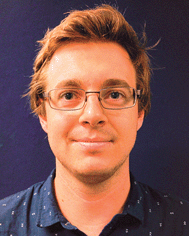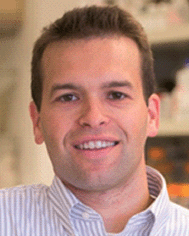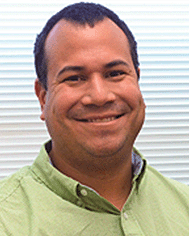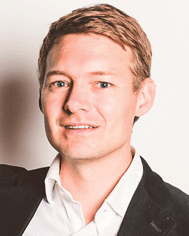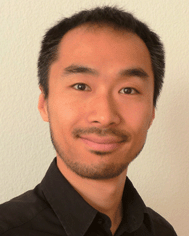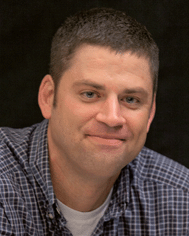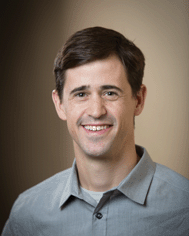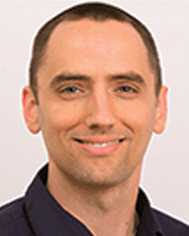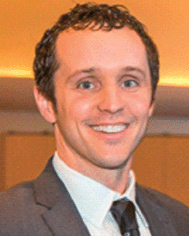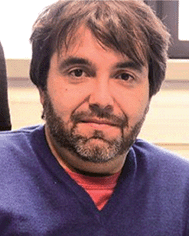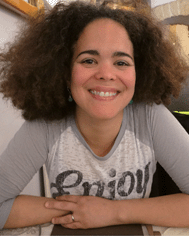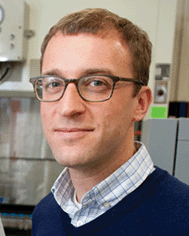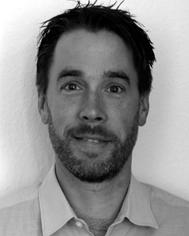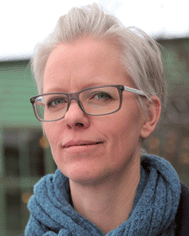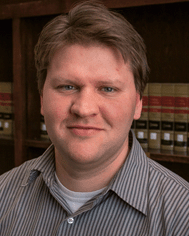Contributors to the Emerging Investigator issue
Dr William Bennett is a Postdoctoral Research Fellow in the Environmental Futures Research Institute, and a Lecturer in Environmental Chemistry in the Griffith School of Environment, at Griffith University in Queensland, Australia. William received his PhD in Environmental and Analytical Chemistry from Griffith University in 2012, and was awarded an Australian Research Council Discovery Early Career Researcher Award fellowship in 2014. William's research focusses on the development and application of innovative tools for investigating the complex biogeochemistry of inorganic contaminants and nutrients in natural waters and sediments.
Dr
Douglas F. Call joined the Department of Civil, Construction, and Environmental Engineering at North Carolina State University as an Assistant Professor in August 2014. Prior to joining NC State, Dr Call was an Assistant Professor in the Department of Civil and Environmental Engineering at Syracuse University for two years. He received his PhD (2011) and MS (2008) in Environmental Engineering from Penn State University, a BS (2005) in Civil Engineering from Virginia Tech, and a BS (2003) in Environmental Sciences from the University of Virginia. Dr Call is interested in biological and electrochemical processes that recover energy, nutrients, and high-value chemicals from unconventional and impaired water sources, such as wastewater and salinity gradients. He combines his multidisciplinary background in microbiology and electrochemistry to elucidate fundamental electrode processes under environmentally relevant conditions and their application in energy recovery and wastewater treatment.
José M. Cerrato has been Assistant Professor in the Department of Civil Engineering at the University of New Mexico since 2013. He received a BS at the National Autonomous University of Honduras in 2001, and MS (2005) and PhD (2010) at Virginia Tech. Between 2010 and 2013, José conducted his postdoctoral studies at Washington University in Saint Louis. His research interests are related to biogeochemical processes at the interface of water and energy that affect the cycle of metals in natural and engineered environments. At the University of New Mexico, José leads the
E-H2O Research Group which applies spectroscopy, microscopy, aqueous chemistry, and molecular biology tools for the study of complex environmental interactions. He has been a recipient of an Organization of American States-Fulbright Scholarship, United States National Science Foundation Integrative Graduate Education Research Traineeship, and the Oak Ridge Associated Universities Ralph E. Powe Junior Faculty Enhancement Award.
Since his MSc in Aquatic Ecotoxicology at the University of Amsterdam (2001),
Steven Droge has been active in various research projects on the environmental impact of chemical substances. His focus is to understand the chemical behaviour of contaminants in a testing system or in the field, in order to better define the biological response to contaminants. His strategy is to improve models on chemical behaviour by generating consistent high quality data on systematic sets of chemicals and step-by-step variation of other parameters. His PhD work at the Institute for Risk Assessment sciences at Utrecht University unravelled the bioavailability of non-ionic and anionic surfactants in marine sediments. On this topic, he won the Dutch best thesis award on Environmental Sciences in 2008. As a Postdoc at the Helmholtz Research Institute in Leipzig he studied the environmental partition behaviour of cationic surfactants and other organic cationic structures such as biocides and drugs. Since 2012, he returned as a Postdoc to Utrecht University to work on the lipophilicity of organic cations, and supervised research on developing passive sampling techniques for cationic drugs, on fish biotransformation of various types of ionic compounds, and on biodegradability of cationic surfactants.
Satoshi Endo is a tenure-track associate professor in the Urban Research Plaza and the Graduate School of Engineering at Osaka City University, Japan. He received his BSc in Environmental and Natural Resource Science at Tokyo University of Agriculture and Technology (2002). He completed his MSc in Applied Environmental Geoscience (2005) and PhD in Applied Geology (2008), both at the Eberhard-Karls-University of Tübingen, Germany. After his doctorate, he joined the research group of Prof. Kai-Uwe Goss at UFZ – Helmholtz Centre for Environmental Research, Leipzig and spent five and a half years exploring the bio-partitioning behavior of organic chemicals. Since 2014, he has been back in his home country and building up a research group in environmental chemistry. His main research field is environmental organic chemistry, particularly the partitioning and sorption behavior of organic chemicals. His current research interests include the partitioning behavior of ionic organic chemicals and the characterization and application of passive sampling techniques.
Soren Eustis was born in Minneapolis, MN (USA), but he spent most of his childhood living in a small town on the banks of the Mississippi River. These experiences instilled in him a great appreciation for the Mississippi and the health of the river ecosystem. He received a BA in Chemistry (ACS Certified) from Grinnell College (Grinnell, IA) in 2003. It was during his tenure at Grinnell that the Ideas of Quantum Chemistry (and some incredibly gifted professors) forever changed the way he saw the world. He received his PhD in Physical Chemistry from Johns Hopkins University in 2009 (Advisor: Prof. Kit H. Bowen). His thesis focused on the spectroscopic signatures of solvated molecules in the gas phase. He then began postdoctoral work at the Swiss Federal Institute of Technology – Zürich (Advisor: Prof. Kris McNeill), where his research included the development of a femtosecond transient absorption and fluorescence instrument to detect short-lived excited state pollutants and photosensitizers in aqueous solutions. In 2012, he joined the faculty of Bowdoin College in Maine, where he serves as an Assistant Professor of Chemistry. His current research interests focus on the application of the theoretical and experimental tools of quantum chemistry to address and mitigate the effects of anthropogenic pollutants in natural waters.
David R. Griffith is an Assistant Professor of Analytical and Environmental Chemistry at Willamette University. His research is focused on characterizing the sources, transformations, and bioactivity of steroidal estrogens in natural waters. David holds a PhD in Environmental Chemistry and Chemical Oceanography from the Massachusetts Institute of Technology/Woods Hole Oceanographic Institution Joint Program (2013). He received his master’s degree in Environmental Science from the Yale School of Forestry and Environmental Studies (2007) and a bachelor’s degree in Chemistry from Bowdoin College (2000). Since then, David has also taught high school science, studied marine fisheries management, and conducted research in isotope biogeochemistry and marine carbon dynamics.
Timothy Julian is the group leader of the Pathogens and Human Health research group in the Department of Environmental Microbiology at Eawag (Dübendorf, Switzerland). The group's mission is to increase the understanding of pathogen transmission at the boundary between humans and the environment to help eliminate infectious disease. Primary research interests are in the fields of pathogen fate and transport, human exposure analyses, quantitative microbial risk assessment, and issues in global water and sanitation provision. Ongoing research projects include work on a broad range of enteric pathogens and antimicrobial resistant bacteria. Before coming to Eawag, Tim worked with Prof. Kellogg J. Schwab as a postdoctoral fellow in the Environmental Health Sciences department at Johns Hopkins Bloomberg School of Public Health (Baltimore, Maryland, USA), and Tim was advised by Prof. Alexandria B. Boehm during his PhD in the Civil and Environmental Engineering Department at Stanford University (Stanford, CA, USA). More information about Tim and his research group can be found
via Eawag at: http://www.eawag.ch/abteilung/umik/schwerpunkte/gesundheit/.
Patrick McNamara is an assistant professor in the Department of Civil, Construction & Environmental Engineering at Marquette University. His research group focuses on the removal of micropollutants from water, wastewater, and biosolids, and on the interactions between microbial communities and micropollutants with a special emphasis on antibiotic resistance. He is particularly interested in the role antimicrobial agents play on the spread of antibiotic resistance in the environment. He earned his PhD in 2012 from the University of Minnesota under the guidance of Paige Novak and his MS in 2008 from the University of Texas at Austin with Des Lawler.
Luca Nizzetto is a biologist with a PhD in environmental sciences. He works at the Norwegian Institute for Water Research (NIVA) in Oslo and at RECETOX, Masaryk University, Czech Republic. His interests are in the assessment of fate, distribution, impact and management of anthropogenic contaminants in the environment. His research focuses, in particular, on analyzing and modelling the coupling between contaminant environmental fate and hydro-biogeochemical cycles. His interests also cover the assessment of ecosystem responses to exposure to environmental pollutants. He is married and father of Matilda (5) and Julius (3).
Jasquelin Peña is an Associate Professor in the Faculty of Geoscience and Environment at the University of Lausanne working on molecular-scale environmental geochemistry. She obtained her PhD in Environmental Engineering at the University of California, Berkeley (2009) and worked in the Earth Sciences Division of the Lawrence Berkeley Laboratory from 2001–2003 and again from 2009–2011. She holds a BS in Chemical Engineering from Yale University, where she learned that chemistry could be applied in elegant ways to understand environmental systems. Jackie grew up in Haverstraw, a suburban community 35 miles north of New York City, and Canca la Piedra, an agricultural town in El Cibao, the Dominican Republic.
Matthew Polizzotto is an associate professor in the Department of Soil Science at North Carolina State University. He studied music and environmental science as an undergraduate at the University of Rochester, and received his PhD in soil and environmental biogeochemistry at Stanford University in 2007. Following a post-doc at Stanford, Matt subsequently worked at the U.S. Agency for International Development as an AAAS Science & Technology Policy Fellow. Matt has been at North Carolina State University since 2010, and he studies and teaches about hydrogeochemical processes controlling contaminants in soils, sediments, and groundwater. In 2013, Matt received the Young Investigator Award from the Soils and Environmental Quality Division of the Soil Science Society of America, and he currently serves as the Soils and Environmental Quality Division Chair. In his free time, he enjoys being outside, playing music, and (most especially) trying to keep up with his two energetic and very silly daughters.
Marco Scheurer studied environmental engineering at the University of Applied Sciences in Bingen, where he received his engineer's degree. After working for the German Federal Institute of Hydrology in Koblenz in the group of Thomas A. Ternes, he moved to Karlsruhe to join the Water Technology Centre, which is part of the German Gas and Water Association (DVGW). While working in the Analysis and Water Quality Department he became an external PhD candidate at the Leuphana University in Lüneburg, from where he earned his PhD in 2012. His research centers on new emerging contaminants: methods for their analysis, their environmental fate and their behavior during drinking water production including the elucidation of their transformation products.
Anna Sobek is assistant professor and research group leader in the Department of Environmental Science and Analytical Chemistry at Stockholm University, Sweden. She holds a PhD in Applied Environmental Science from Stockholm University and was formerly a post-doctoral fellow at the Swiss Centre of Excellence for Agricultural Research, Zürich, Switzerland. She thereafter worked with chemicals management at the Administrative County Board, in Gävle, Sweden, and came back to the University in 2011. She is a leader of the strategic group for external relations at the Department of Environmental Science and Analytical Chemistry at Stockholm University; a group which aims at promoting a dialogue between academia and authorities in environmental science. Her research focuses on environmental fate and risk of organic contaminants, with an emphasis on the aquatic environment.
Timothy M. Vadas is an Assistant Professor in the Department of Civil and Environmental Engineering at the University of Connecticut. Tim holds not one, but two BS degrees in the same field of Bioresource Engineering from Rutgers University, and a PhD from Cornell University in Environmental Engineering where he was also an IGERT Fellow in the Biogeochemistry Program. Those five long years of biogeochemistry seminars engrained the ecosystem concepts necessary to focus his current research on coupled elemental cycles controlling metal and other contaminant fate in the environment. At home, he re-explores the world through the eyes of his two young kids.
|
| This journal is © The Royal Society of Chemistry 2016 |
Click here to see how this site uses Cookies. View our privacy policy here. 
